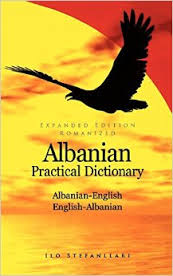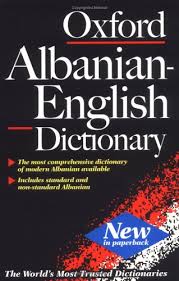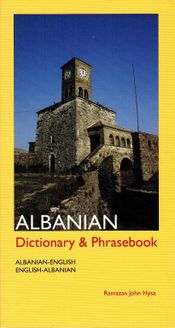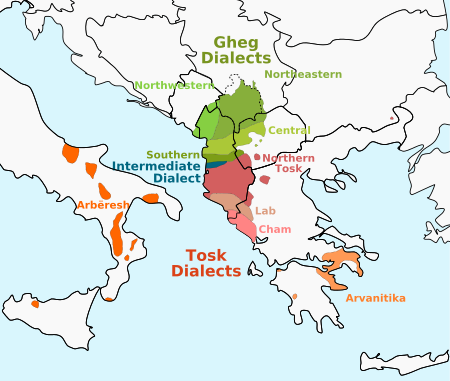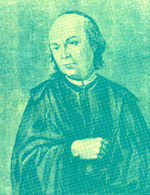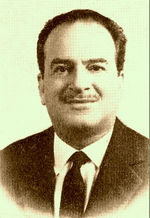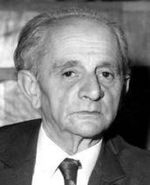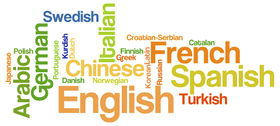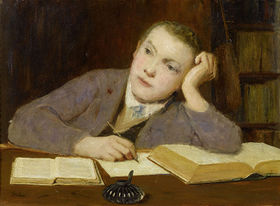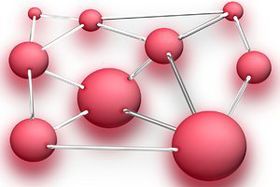Difference between revisions of "Category:Albanian language"
| Line 37: | Line 37: | ||
[[File:Gjergj Fishta.jpg|thumb|150px|[[Gjergj Fishta]]]] | [[File:Gjergj Fishta.jpg|thumb|150px|[[Gjergj Fishta]]]] | ||
[[File:Namik Resuli.jpg|thumb|150px|[[Namik Resuli]]]] | [[File:Namik Resuli.jpg|thumb|150px|[[Namik Resuli]]]] | ||
[[File:Martin Camaj.jpg|thumb|150px|[[Martin Camaj]]]] | |||
[[File:Eqrem Çabej.jpg|thumb|150px|[[Eqrem Çabej]]]] | [[File:Eqrem Çabej.jpg|thumb|150px|[[Eqrem Çabej]]]] | ||
[[File:Simon Filipaj.jpg|thumb|150px|[[Simon Filipaj]]]] | [[File:Simon Filipaj.jpg|thumb|150px|[[Simon Filipaj]]]] | ||
Revision as of 06:36, 27 September 2015
|
Albanian language -- History of research -- Overview Meshari (The Missal, 1555) by Catholic cleric Gjon Buzuku, is the earliest extant literary work of written Albanian. This translation of significant parts of the Catholic Liturgy into Albanian contains the liturgies of the main religious holidays of the year, comments from the book of prayers, excerpts from the Bible as well as excerpts from the ritual and catechism. Pjetër Bogdani's Çeta e profetëve, published in Italy in 1685, is an early example of biblical history, containing the History of Israel and the Life of Jesus. It was the only piece of Albanian scholarship to be translated into Latin (Cuneus Prophetarum, 1685) and Italian (L'infallibile verità della cattolica fede, 1691). In 1761 the Elbasan Gospel Manuscript (Anonimi i Elbasanit), probably a work by Gregory of Durrës, was the first translation in Albanian of portions of the New Testament. In 1762 Giulio Variboba published a poem of The Life of the Virgin Mary. In 1827 the integral text of the New Testament (Dhiata e Re) was translated by Vangjel Meksi and Grigor Gjirokastriti into Albanian (in a Greek-Albanian edition). The New Testament was translated into Albanian again in 1872 by Kostandin Kristoforidhi. In the first half of the 20th century a few works of biblical subject were published in Albanian, most notably, the play Juda Makabé by Gjergj Fishta (1914). In 1921 the first translation of the Qur'an in Albanian was completed by Ilo Mitke Qafëzezi. In 1932 Albanian-American scholar Fan Stylian Noli published an English translation of the New Testament "from the approved Greek text of the Church of Constantinople and the Church of Greece." During the communist regime, Albanian was a completely isolated country and the study of religion was forbidden. The most conspicuous exception is the work of philologist Eqrem Çabej on the Missal of Gjon Buzuku, of which Namik Resuli had published the transcription in 1958. The work of Pjetër Bogdani also was reprinted in 1977 in Germany by Giuseppe Valentini and Martin Camaj. New translations of ancient religious texts in Albanian could be published only abroad, in Serbia by Simon Filipaj (Gospel of Matthew, 1977; New Testament, 1980), Feti Mehdiu (Qur'an, 1985), H. Sherif Ahmeti (Qur'an, 1988) and Hasan I. Nahi (Qur'an 1988), or in England by Muhammad Zakaria Khan (Qur'an, 1990). After the fall of the communist regime in 1992, the first edition of the whole Christian Bible were published in Albanian--the Protestant Bible by Stephen Etches in 1993 and the Catholic Bible (with the OT Apocrypha) by Simon Filipaj in 1994. Two major studies were published in Albania in the 1990s, summarizing the history of the translations of the Christian Bible and the Qur'an in Albanian, by Feti Mehdiu in 1996 and Engjëll Sedaj in 1999. The second revised edition of Khan's translation of the Qur'an appeared in Germany in 2003. The success of the novel The Da Vinci Code also reached Albania in 2004. Thanas Gjika introduced the critical study of the New Testament. Albanian scholars are still struggling to regain their place in international scholarship.
Albanian authorship |
|
Albanian works in translation
Pages in category "Albanian language"
The following 51 pages are in this category, out of 51 total.
1
- == == 1500s == == ==
- Meshari (The Missal / 1555 Buzuku), book (Albanian)
- == == 1600s == == ==
- Çeta e profetëve / Cuneus Prophetarum (The Bands of the Prophets / 1685 Bogdani), book (Albanian-Latin ed.)
- Çeta e profetëve / L'infallibile verità della cattolica fede (The Bands of the Prophets / 1691 @1685 Bogdani), book (Albanian-Italian ed.)
- == == 1700s == == ==
- Anonimi i Elbasanit (Elbasan Gospel Manuscript / 1761 Gregory of Durrës), ms. (Albanian)
- Ghiella e Shën Mëriis Virghiër (The Life of the Virgin Mary / 1762 Variboba), poetry
- Oungilli i Iesou Chrisstoït zotit sënë kië na sspëtöi si kountrë sskrouan Ssent Matthaioua (Gospel of Matthew / 1824 Meksi, Gjirokastriti), book (Greek-Albanian ed.)
- Dgiata e re e Zotit sony key na Shpytoi Iesou Chrishtoit (New Testament of Our Lord and Savior Jesus Christ / 1827 Meksi, Gjirokastriti), book (Greek-Albanian ed.)
- Kater ungilat' e zotit ede selbuesit tune Iesu-Kristit, ede Punet' e Apostuyvet (The Four Gospels and the Acts of Apostles / 1872 Kristoforidhi), book
- Juda Makabé (Judas Maccabeus / 1914 Fishta), play
- Kuráni (Qur'an / 1921 Qafëzezi), book
- Il Messale di Giovanni Buzuku / Meshari i Gjon Buzukut (The Missal of Gjon Buzuku / 1958 Resuli), book (Italian-Albanian ed.)
- Meshari i Gjon Buzukut: botim kritik (The Missal of Gjon Buzuku: Critical Edition / 1968 Çabej), book
- Gjon Buzuku dhe gjuha e tij (Gjon Buzuku and His Language / 1977 Çabej), book
- Çeta e profetëve / Cuneus Prophetarum (The Bands of the Prophets / 1977 @ 1685 Bogdani / Valentini, Camaj), book (reprint)
- Ungjilli Shenjt Sipas Mateut (The Holy Gospel According to Matthew / 1977 Filipaj), book
- Besëlidhja e re: përktheu nga teksti origjinal (The New Testament: Translated from the Original Text / 1980 Filipaj), book
- Kur'ani (Qur'an / 1985 Mehdiu), book
- Kur'ani: Përkthim me komentim (Qur'an: Translation with Commentary / 1988 Ahmeti), book
- Kur'ani i madhëruar (Holy Qur'an / 1988 Nahi), book
- Kurani i Shentjë: përkthim e komentim, 1st ed. (Qur'an: Translation and Commentary / 1990 Khan), book
- Bibla: Dhiata e Vjetër dhe Dhiata e Re (Bible: Old and New Testaments / 1993 Etches, et al.), book
- Shkrimi shenjt: Besëlidhja e Vjeter dhe Besëlidhja e Re (Sacred Scripture: Old Testament and New Testament / 1994 Filipaj), book
- Përkthimet e Kur'anit në gjuhën shqipe (Translations of the Qur'an in Albanian / 1996 Mehdiu), book
- Bibla & Përkthimet e saj në gjuhën shqipe (The Bible & Its Translations in Albanian / 1999 Sedaj), book
2
- == == 2000s == == ==
- Kurani kerim: përkthim e komentim në gjuhen shqipe, 2nd ed. (Qur'an: Translation and Commentaru in Albanian / 2003 Khan), book
- Kodi da Vinçi = The Da Vinci Code (2004 @2003 Brown / Jorgoni), novel (Albanian ed.)
- Kur dhe ku u shkrua Dhiata e Re (When and Where Was the New Testament Written / 2007 Gjika), book
- == == 2010s == == ==
~
- Gjon Buzuku (M / Albania, 1499-1577), scholar
- Pjetër Bogdani (1630–1689), Albanian scholar
- Giulio Variboba (1725-1788), Albanian-Italian poet
- Grigor Gjirokastriti (17??–1828), Albanian scholar
- Vangjel Meksi (1770–1821), Albanian scholar
- Kostandin Kristoforidhi (1827-1895), scholar
- Gjergj Fishta (M / Albania, 1871-1940), playwright
- Giuseppe Valentini (M / Italy, 1900-1979), scholar
- Eqrem Çabej (M / Albania, 1908-1980), Albanian scholar
- Namik Resuli (1908-1985), Albanian scholar
- Martin Camaj (M / Albania, 1925-1992), scholar
- Simon Filipaj (M / Albania, 1925-1999), scholar
- Engjëll Sedaj (M / Albania, 1943-2006), scholar
